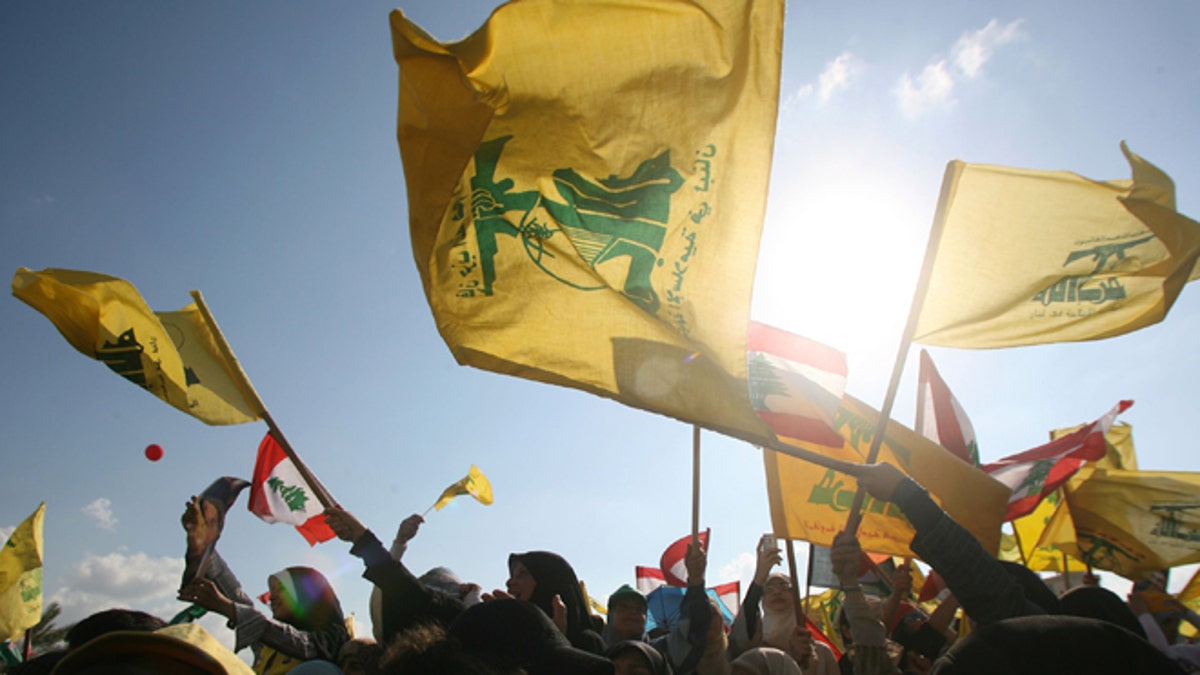
BEIRUT, LEBANON- SEPTEMBER 22: Hezbollah supporters wave flags during a ''Victory over Israel'' rally in Beirut's suburbs on September 22, 2006 in Beirut, Lebanon. Hezbollah leader Sayyed Hassan Nasrallah reportedly said that Hezbollah would not disarm until a Lebanese government capable of protecting the country was in place during the rally. (Photo by Salah Malkawi/Getty Images) (Getty Images)
One of Brazil’s largest media outlets released a police document that purportedly shows links between the South American nation’s largest and most notorious gang and the Lebanon-based Islamic militant group Hezbollah – giving more credence to those who claim the Middle Eastern group is making inroads throughout Latin America.
The police documents, revealed by Brazilian media conglomerate O Globo, tell of links between weapon traffickers tied to Hezbollah and the Brazilian prison gang First Capital Command (PCC), in which traffickers operating in the tri-border region of Argentina, Brazil and Paraguay supply weapons to the PCC in exchange for protection of inmates of Lebanese origin in Brazil’s prisons.
Besides putting the PCC in contact with weapon dealers on the shady international arms market, the alleged Hezbollah-linked traffickers also acted as intermediaries in the sale of C4 explosives that the PCC stole from Paraguay.
These connections between the two groups apparently date back to 2006 and first surfaced on the Brazilian police’s radar in 2008.
The document was released just a couple of weeks after Mohammed Amadar, a suspected Hezbollah operative, was arrested in the neighboring country of Peru on suspicion of planning attacks on Israeli and Jewish targets.
Peruvian newspaper La Republica reported that the man, who is a Lebanese citizen, had been gathering intelligence on places frequented by Israelis and had been handling TNT, detonators and flammable substances in his Lima apartment.
According to The Times of Israel, the man had arrived in Peru in November 2013 and married a woman with both Peruvian and American citizenship just two weeks later.
In recent years, a number of links have been revealed between Hezbollah and groups or individuals in Brazil.
Last spring, Brazil’s Civil Police arrested Hamzi Ahmad Barakat in the city of Curitiba under allegations that he had connections to a network of front companies that fleeced Lebanese immigrants who had recently moved to Brazil.
Barakat, who allegedly has ties to the infamous Triple Frontier region, is listed in the United States as a member of Hezbollah and is suspected of trafficking arms, drugs, explosives and counterfeit bills.
“He was preying on his own countrymen, using their identities to create companies to carry out schemes,” said Cassiano Aufiero, the police investigator in charge of the case.
Aufiero added that while he knew of Barakat’s purported ties to the Islamic militant group, he said that he was under arrest for different matters, including embezzlement and the creation of false documents.
Barakat’s arrest shed more light on the Triple Border region, which has become a hotspot for smugglers and drawn the attention of the U.S., Israel and governments throughout South America.
The region has drawn a number of immigrants for the Middle East, particularly from Lebanon, and is believed to be one of Hezbollah's major areas of operation outside of the Islamic world, due to its seclusion, loose borders, rampant political corruption and weak judicial system. Brazil has one of the largest Lebanese population’s outside of Lebanon with at least 7 million people from that country residing there and some estimates claiming closer to 13 million.
In 2004, Barakat’s brother, Assad Ahmad Barakat, was named by the Treasury Department as one of Hezbollah’s “most prominent and influential members” and was believed to have used an electronics wholesale store in the Triple Frontier as a cover for raising funds for Hezbollah. The Brazilian police arrested him in 2002 and deported him to Paraguay, where he went to prison for tax evasion.
Follow us on twitter.com/foxnewslatino
Like us at facebook.com/foxnewslatino




















